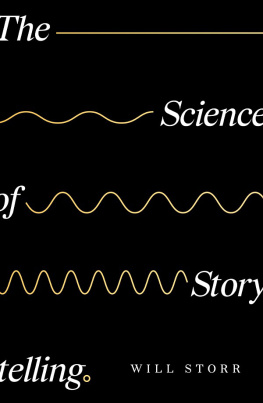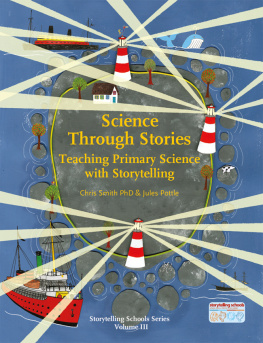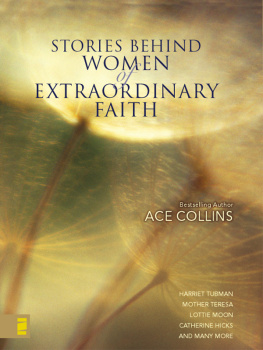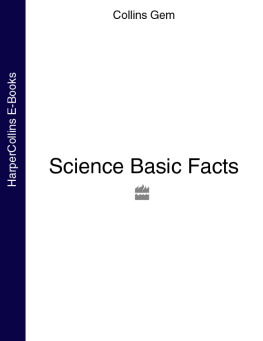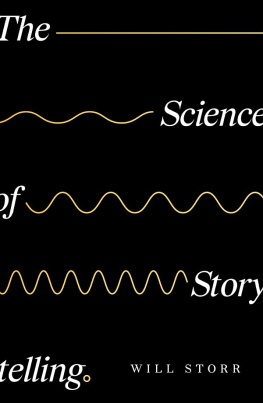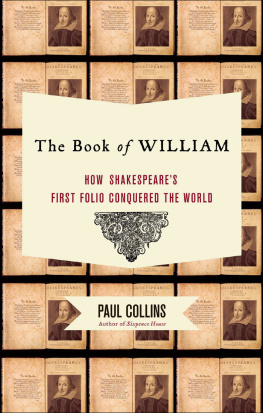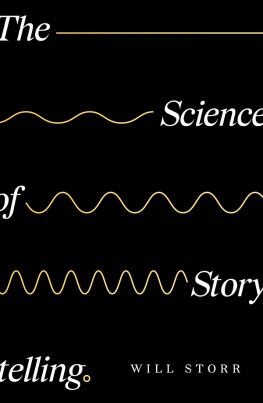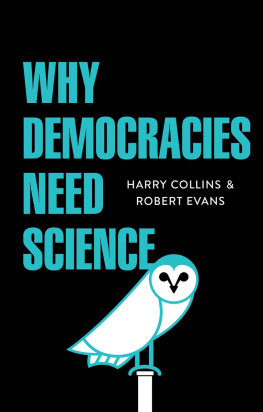William Collins Sons - The Science of Storytelling
Here you can read online William Collins Sons - The Science of Storytelling full text of the book (entire story) in english for free. Download pdf and epub, get meaning, cover and reviews about this ebook. City: London, year: 2019, publisher: HarperCollinsPublishers;William Collins, genre: Religion. Description of the work, (preface) as well as reviews are available. Best literature library LitArk.com created for fans of good reading and offers a wide selection of genres:
Romance novel
Science fiction
Adventure
Detective
Science
History
Home and family
Prose
Art
Politics
Computer
Non-fiction
Religion
Business
Children
Humor
Choose a favorite category and find really read worthwhile books. Enjoy immersion in the world of imagination, feel the emotions of the characters or learn something new for yourself, make an fascinating discovery.
- Book:The Science of Storytelling
- Author:
- Publisher:HarperCollinsPublishers;William Collins
- Genre:
- Year:2019
- City:London
- Rating:5 / 5
- Favourites:Add to favourites
- Your mark:
- 100
- 1
- 2
- 3
- 4
- 5
The Science of Storytelling: summary, description and annotation
We offer to read an annotation, description, summary or preface (depends on what the author of the book "The Science of Storytelling" wrote himself). If you haven't found the necessary information about the book — write in the comments, we will try to find it.
The Science of Storytelling — read online for free the complete book (whole text) full work
Below is the text of the book, divided by pages. System saving the place of the last page read, allows you to conveniently read the book "The Science of Storytelling" online for free, without having to search again every time where you left off. Put a bookmark, and you can go to the page where you finished reading at any time.
Font size:
Interval:
Bookmark:


William Collins
An imprint of HarperCollinsPublishers
1 London Bridge Street
London SE1 9GF
www.WilliamCollinsBooks.com
This eBook first published in Great Britain by 4th Estate in 2019
Copyright William Storr 2019
Cover design by Jack Smythe
William Storr asserts the moral right to be identified as the author of this work
A catalogue record for this book is available from the British Library
All rights reserved under International and Pan-American Copyright Conventions. By payment of the required fees, you have been granted the non-exclusive, non-transferable right to access and read the text of this e-book on-screen. No part of this text may be reproduced, transmitted, down-loaded, decompiled, reverse engineered, or stored in or introduced into any information storage and retrieval system, in any form or by any means, whether electronic or mechanical, now known or hereinafter invented, without the express written permission of HarperCollins
Source ISBN: 9780008276935
Ebook Edition April 2019 ISBN: 9780008276959
Version: 2019-04-08
For my firstborn, Parker
Ah, but a mans reach should exceed his grasp,
Or whats a heaven for?
Robert Browning (18121889)
Contents
We know how this ends. Youre going to die and so will everyone you love. And then there will be heat death. All the change in the universe will cease, the stars will die, and therell be nothing left of anything but infinite, dead, freezing void. Human life, in all its noise and hubris, will be rendered meaningless for eternity.
But thats not how we live our lives. Humans might be in unique possession of the knowledge that our existence is essentially meaningless, but we carry on as if in ignorance of it. We beetle away happily, into our minutes, hours and days, with the fact of the void hovering over us. To look directly into it, and respond with an entirely rational descent into despair, is to be diagnosed with a mental-health condition, categorised as somehow faulty.
The cure for the horror is story. Our brains distract us from this terrible truth by filling our lives with hopeful goals and encouraging us to strive for them. What we want, and the ups and downs of our struggle to get it, is the story of us all. It gives our existence the illusion of meaning and turns our gaze from the dread. Theres simply no way to understand the human world without stories. They fill our newspapers, our law courts, our sporting arenas, our government debating chambers, our school playgrounds, our computer games, the lyrics to our songs, our private thoughts and public conversations and our waking and sleeping dreams. Stories are everywhere. Stories are us.
Its story that makes us human. to enjoy them.
tales we tell and enjoy.
We experience our day-to-day lives in story mode. The brain creates a world for us to live in and populates it with allies and villains. It turns the chaos and bleakness of reality into a simple, hopeful tale, and at the centre it places its star wonderful, precious me who it sets on a series of goals that become the plots of our lives. Story is what brain does. , not a logic processor. Story emerges from human minds as naturally as breath emerges from between human lips. You dont have to be a genius to master it. Youre already doing it. Becoming better at telling stories is simply a matter of peering inwards, at the mind itself, and asking how it does it.
This book has an unusual genesis in that its based on a storytelling course that is, in turn, based on research Ive carried out for various books. My interest in the science of storytelling began about a decade ago when I was working on my second book, The Heretics, which was an investigation into the psychology of belief. I wanted to find out how intelligent people end up believing crazy things. The answer I found was that, if were psychologically healthy, our brain makes us feel as if were the moral heroes at the centre of the unfolding plots of our lives. Any facts it comes across tend to be subordinate to that story. If these facts flatter our heroic sense of ourselves, were likely to credulously accept them, no matter how smart we think we are. If they dont, our minds will tend to find some crafty way of rejecting them. The Heretics was my introduction to the idea of the brain as a storyteller. It not only changed the way I saw myself, it changed the way I saw the world.
It also changed the way I thought about my writing. As I was researching The Heretics, I also happened to be working on my first novel. Having struggled with fiction for years Id finally buckled and bought a selection of traditional how-to guides. Reading through them, I noticed something odd. Some of the things the story theorists were saying about narrative were strikingly similar to what the psychologists and neuroscientists Id been interviewing had been telling me about brain and mind. The storytellers and the scientists had started off in completely different places and had ended up discovering the same things.
As I continued my research, for subsequent books, I continued making these connections. I started to wonder if it might be possible to join the two fields up and thereby improve my own storytelling. That ultimately led to my starting a science-based course for writers which turned out to be unexpectedly successful. Being faced regularly with roomfuls of extremely smart authors, journalists and screenwriters pushed me to deepen my investigations. Soon, I realised I had about enough stuff to fill a short book.
My hope is that what follows will be of interest to anyone curious about the science of the human condition, even if they have little practical interest in storytelling. But its also for the storytellers. The challenge any of us faces is that of grabbing and keeping the attention of other peoples brains. Im convinced we can all become better at what we do by finding out a bit about how they work.
This is an approach that stands in contrast to more traditional attempts at decoding story. These typically involve scholars comparing successful stories or traditional myths from around the world and working out what they have in common. From such techniques come predefined plots that put narrative events in a sequence, like a recipe., which, in its full form, has seventeen parts that track the phases of a heros journey from their initial call to adventure onwards.
Such plot structures have been hugely successful. Theyve drawn crowds of millions and dollars by the billions. Theyve led to an industrial revolution in yarn-spinning thats especially evident in cinema and long-form television. Some examples, such as the Campbell-inspired Star Wars: A New Hope, are wonderful. But too many more are Mars Bar stories, delicious and moreish but ultimately cold, corporate and cooked up by committee.
For me, the problem with the traditional approach is that its led to a preoccupation with structure. Its easy to see why this has happened. Often the search has been for the One True Story the ultimate, perfect plot structure by which every tale can be judged. And how are you going to describe that if not by dissecting it into its various movements?
I suspect its this emphasis on structure thats responsible for the clinical feel from which many modern stories suffer. I believe the focus on plot should be shifted onto character. Its
Font size:
Interval:
Bookmark:
Similar books «The Science of Storytelling»
Look at similar books to The Science of Storytelling. We have selected literature similar in name and meaning in the hope of providing readers with more options to find new, interesting, not yet read works.
Discussion, reviews of the book The Science of Storytelling and just readers' own opinions. Leave your comments, write what you think about the work, its meaning or the main characters. Specify what exactly you liked and what you didn't like, and why you think so.

